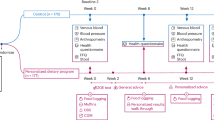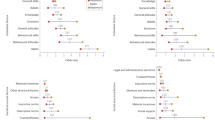Abstract
The methodology of the IDEFICS (Identification and prevention of dietary- and lifestyle-induced health effects in children and infants) study raises a number of important ethical questions. Many of these are already well recognised in ethical guidelines that uphold principles of individual and parental consent, confidentiality and scientific review. There are, however, wider issues that require ethical reflection. In this paper, we focus on a set of problems surrounding the evaluation of complex social interventions, and argue that comprehensive and objective evaluation is a much more ethically charged aim than it may first appear. In particular, we contend that standard scientific measures—of body size and biomarkers—convey only part of the story. This is partly because, when we intervene in communities, we are also concerned with complex social effects. These effects are made even more complex by contemporary social anxieties about fat and physical appearance, as well as about the safety and security of children. Such anxieties increase the risk of undesirable side effects that are themselves difficult to gauge. In the face of these and other complexities, we argue that the evaluation of interventions should involve a strong ethical dimension. First, it must include—as does the IDEFICS study—consideration of the opinions of the people affected, who are subjected to interventions in ways that necessarily go beyond individual consent. Second, we suggest that interventions might also be assessed by how much they empower people—and especially those persons, such as children, who are otherwise often disempowered.
This is a preview of subscription content, access via your institution
Access options
Subscribe to this journal
Receive 12 print issues and online access
$259.00 per year
only $21.58 per issue
Buy this article
- Purchase on Springer Link
- Instant access to full article PDF
Prices may be subject to local taxes which are calculated during checkout
Similar content being viewed by others

References
Campos P . The Obesity Myth: Why America's Obsession with Weight is Hazardous to Your Health. Gotham Books: New York, 2004.
Oliver JE . Fat Politics: The Real Story Behind America's Obesity Epidemic. Oxford University Press: Oxford, 2006.
Puhl RM, Latner JD . Stigma, obesity, and the health of the nation's children. Psychol Bull 2007; 133: 557–580.
Schwartz MB, Brownell KD . Obesity and body image. Body Image 2004; 1: 43–56.
Luik J, Basham P, Gori G . Diet Nation: Exposing the Obesity Crusade. Social Affairs Unit: London, 2006.
Lang T, Rayner G . Overcoming policy cacophony on obesity: an ecological public health framework for policymakers. Obes Rev 2007; 8 (Suppl 1): 165–181.
Fussenegger D, Piotrobelli A, Widhalm K . Childhood obesity: political developments in Europe and related perspectives for future action on prevention. Obes Rev 2007; 9: 76–82.
Haby MM, Vos T, Carter R, Moodie M, Markwick A, Magnus A et al. A new approach to assessing the health benefit from obesity interventions in children and adolescents: the assessing cost-effectiveness in obesity project. Int J Obes 2006; 30: 1463–1475.
Huang TT, Drewnowski A, Kumanyika SK, Glass TA . A systems-oriented multilevel framework for addressing obesity in the 21st century. Prev Chronic Dis 2009; 6(3): A82.
Office of Communications. Ofcom's review of the effects of the HFSS (high fat, salt and sugar) advertising restrictions, December 2008, http://www.media.ofcom.org.uk/2008/12/17/ofcoms-review-of-the-effects-of-the-hfss-advertising-restrictions.
Lake J . The development of surveillance and screening for childhood obesity in the UK. Crit Publ Health 2009; 19/1: 3–10.
Denton S-A, Griffith C . Nursery School Meals Project for Hampshire County Council Trading Standards Service: Nutritional Interpretation and Findings, 2009, http://www.3.hants.gov.uk/food/food-nursery-summary.htm.
The European Commission Directorate-General for Health and Consumer Protection (DG SANCO). Evaluation of the Food Labelling Legislation, October 2003, http://www.ec.europa.eu/food/food/labellingnutrition/foodlabelling/effl_conclu.pdf.
Department of Health. The National School Fruit Scheme: Evaluation Summary, November 2001, http://www.dh.gov.uk/en/Publicationsandstatistics/Publications/PublicationsPolicyAndGuidance/DH_4009412.
Pettigrew S, Donovan RJ, Jalleh G, Pescud M, Cowie S . Addressing Childhood Obesity through School Canteens. University of Western Australia and the Curtin University, 2009, http://www.det.wa.gov.au/healthyfoodanddrink/docs/FinalCanteenStudy_13May2009.pdf.
Wickins-Drazilova D, Nicholls S, Williams G, Börnhorst C, Grafström L, De Henauw S et al. Parental views on public-policy regarding healthy eating. Proceedings of the Congress of the European Society for Agricultural and Food Ethics. Bilbao, Spain, September 2010, pp 184–188.
BBC News. Parents feed pupils through gates, 15 September 2006, http://news.bbc.co.uk/1/hi/england/south_yorkshire/5349392.stm.
Williams G . Children as means and ends in large-scale medical research. Bioethics (forthcoming).
Acknowledgements
This work was carried out as part of the IDEFICS study (www.idefics.eu). We gratefully acknowledge the financial support of the European Community within the Sixth RTD Framework Programme, Contract No. 016181 (FOOD). We are grateful to Kath Sharman and Mandy Stockley for providing information about the SHINE programme. We also thank the editor and two anonymous reviewers for providing feedback on earlier drafts, and Kristin Voigt for additional help. DW-D and GW received grant support from IDEFICS.
The information in this document reflects the authors’ views and is provided as is.
Author information
Authors and Affiliations
Consortia
Corresponding author
Ethics declarations
Competing interests
The authors declare no conflict of interest.
Rights and permissions
About this article
Cite this article
Wickins-Drazilova, D., Williams, G. & on behalf of the IDEFICS Consortium. The ethics of evaluating obesity intervention studies on children. Int J Obes 35 (Suppl 1), S24–S29 (2011). https://doi.org/10.1038/ijo.2011.32
Published:
Issue Date:
DOI: https://doi.org/10.1038/ijo.2011.32
Keywords
This article is cited by
-
Is children’s weight a public health or a private family issue? A qualitative analysis of online discussion about National Child Measurement Programme feedback in England
BMC Public Health (2018)
-
Bariatric surgery for obese children and adolescents: a review of the moral challenges
BMC Medical Ethics (2013)
-
Five-minutes-to-twelve for implementation of early changes in dietary and lifestyle behaviour across Europe
International Journal of Obesity (2011)


